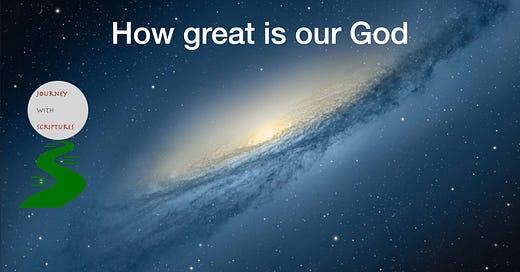Psalm 145:2-5, 10-11
The psalmist today speaks about the unsearchable greatness of the Lord. The Church teaches that our knowledge of God is limited and so is our language about him (see CCC, 40). We cannot confuse our human representation of God with "the inexpressible, the incomprehensible, the invisible, the ungraspable" God of our faith. Our human words always fall short of the mystery of God” (CCC, 42).
One of the greatest theologians of our Church, Saint Thomas Aquinas said that "concerning God, we cannot grasp what he is, but only what he is not”. The differences between God and all he created are greater than any similarities (see CCC, 43). We simply are unable to describe the greatness of our Lord. No matter what we say about our God, He is still vastly greater. And yet, we need to talk about God and the glory of His kingdom. But how?
The Book of Wisdom gives us a clue. “For from the greatness and the beauty of created things their original author, by analogy, is seen” (Wisdom 13:5). The author indicates that the created world, God’s works, reveals the Creator. If we are fascinated by the beauty and vastness of the universe, we should realise how much greater is the One who created it. Every truth, goodness, and beauty found in human beings and other creatures reveals the infinite truth, goodness, and beauty of God.
But, this great God whose greatness is unsearchable has one incredible characteristic: “The LORD is near to all who call on him, to all who call on him in truth” (Ps 145:18). This nearness of unfathomable God is proclaimed in the writings of the New Testament. “The Word became flesh and dwelled among us and we have seen his glory” (John 1:14). In Jesus Christ, we get to know the unfathomable mystery of God, His unsearchable greatness and His intimacy towards those who call on Him.
The psalmist says that all the faithful should talk about God’s kingdom and His might. The first statement leads to the message of the Synoptic Gospels (Matthew, Mark, Luke) that narrate for us Jesus’ proclamation of God’s kingdom. The second statement is clarified in our liturgy and the teaching of the Church. God’s might is like no other. In one of the liturgical prayers of the Church, we proclaim: "God, you show your almighty power above all in your mercy and forgiveness. . ." (Roman Missal, 26th Sunday, Opening Prayer, quoted in CCC, 277). Our Catechism teaches that the greatest expression of his almighty power is when he converts “us from our sins” and restores “us to his friendship by grace” (see CCC, 277).




